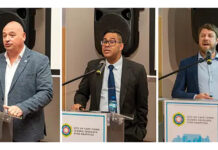Eric Enslin CEO of Private Banking and Advisory at FNB
Against the backdrop of a widening budget deficit, sluggish economic recovery, and increasing social demands, the much-anticipated annual budget speech, on the 12th of March introduced key tax adjustments, spending priorities, and debt management strategies.
With a focus on balancing revenue generation and economic support, this year’s budget aims to stabilise public finances while ensuring critical investments in infrastructure, healthcare, and social welfare. The 2025 budget was particularly significant as it responds to both domestic and global financial pressures, shaping South Africa’s economic trajectory in the years ahead. Another important aspect to address, is that this year’s budget has been tabled and not passed, meaning more discussions to take place within the coalition parties before approval.
Eric Enslin unpacks the topics of tax, investment, property and offshore considerations against the context of this year’s National Budget:
Tax considerations:
VAT:
The proposed 2% increase was one of the main reasons for the postponement of the annual budget speech in February. To bolster revenue, the minister of finance proposed a phased increase in the VAT rate:
- May 1, 2025: Increase from 15% to 15.5%
- April 1, 2026: Further increase to 16%
Personal income tax: The budget maintains current personal income tax brackets and rebates, effectively increasing the tax burden on individuals due to inflation. This measure aims to raise an additional R19.5 billion in the 2025/26 fiscal year.
Corporate income tax: The company tax rate remains unchanged at 27%, aligning with the government’s strategy to support economic growth and employment.
The budget projects that proposed tax measures will raise an additional R28 billion in 2025/26 and R14.5 billion in 2026/27.
Market impact and investor consideration:
The budget was more bond friendly than equity friendly. During the speech, the Rand hovered at weaker levels, and bond yields came down sharply after rising earlier in the day. The equity market recovered after a sharp dip at the start of the speech from intra-day highs. In particular, the Financials 15 index along with the Small and Mid-cap indices (which are good proxies for SA Inc.) moved sharply down before recovering to end higher on the day.
For bonds:
A sustained commitment to debt consolidation will be welcomed by debtholders. A primary surplus is still expected this year and will increase from 0.5% this year to 0.9% of GDP in fiscal 2025/2026. This will help debt peak and stabilise debt at 76.2% of GDP. However, this is at a slightly higher level than envisioned in the MTBPS and 2024 Budget, which may be negatively perceived by debt holders.
For equities:
Optically, this was a negative budget for equities as higher taxes are generally regarded as negative from an economic growth perspective. Some of the measures put in place to protect lower income consumers and SMEs may limit this impact somewhat. Additionally, National Treasury remains notably serious about structural reforms and boosting economic growth, but this could take longer to materialise into a meaningful shift in the economic environment, consumer and business spending patterns, and a lift in corporate profitability.
Investment considerations:
The phased VAT increase, while designed to bolster government revenue, may impact consumer spending and inflation, influencing sectors such as retail and manufacturing. The government’s decision to maintain corporate tax rates signals stability for investors, although declining corporate tax collections highlight economic headwinds. Infrastructure investment remains a priority, with increased allocations to energy and transport, presenting opportunities for private sector participation and public-private partnerships. Additionally, proposed tax incentives for renewable energy projects and small businesses aim to stimulate economic growth and attract foreign direct investment. However, concerns over rising debt levels and potential political opposition to tax increases may create short-term uncertainty. Investors should monitor policy developments closely and consider sector-specific opportunities arising from government spending priorities and fiscal reforms.
Property considerations:
The transfer duty bracket has been increased in this year’s budget. The property value below which no transfer duty is payable has been increased by 10%, rising from R1.1 million to R1.21 million. This adjustment is designed to alleviate the financial burden on homebuyers, particularly first-time purchasers, by reducing upfront costs associated with property transactions.
The escalation in VAT, however, is anticipated to elevate costs across various sectors, including property-related services such as conveyancing and maintenance, potentially offsetting some benefits gained from the transfer duty relief.
Additionally, the Capital Gains Tax (CGT) exemption thresholds remain unchanged, maintaining the annual exclusion at R40,000 and the primary residence exclusion at R2 million. These fiscal measures collectively aim to balance the promotion of property ownership with the need to enhance government revenue, influencing both current and prospective property investors.
Offshore considerations:
While no immediate changes were made to foreign investment allowances, the government reaffirmed its commitment to tightening exchange control regulations to curb illicit financial flows and enhance tax compliance. Investors with offshore holdings should closely monitor potential changes to the capital flow management framework, which may impact international investment strategies.
The depreciation of the rand, coupled with global economic uncertainties, reinforces the importance of diversification into foreign assets. Additionally, South African expatriates remain subject to the expatriate tax regime, requiring the declaration and payment of tax on foreign income exceeding the annual exemption threshold. As regulatory shifts continue, offshore investors should seek professional advice to ensure compliance and optimisation of global portfolios within the evolving fiscal landscape.
Take out:
This year’s budget has been tabled but not yet passed, as it awaits full support from the GNU. In the coming weeks, parliamentary processes will provide an opportunity for consensus. While this brings some uncertainty, it also reflects a strengthening of checks and balances in our legislative system. The focus remains on structural reforms, economic growth, and debt consolidation—now it’s time to turn commitments into action.
South Africa may face many challenges, but it’s important to remember that amidst challenges come great opportunities.















